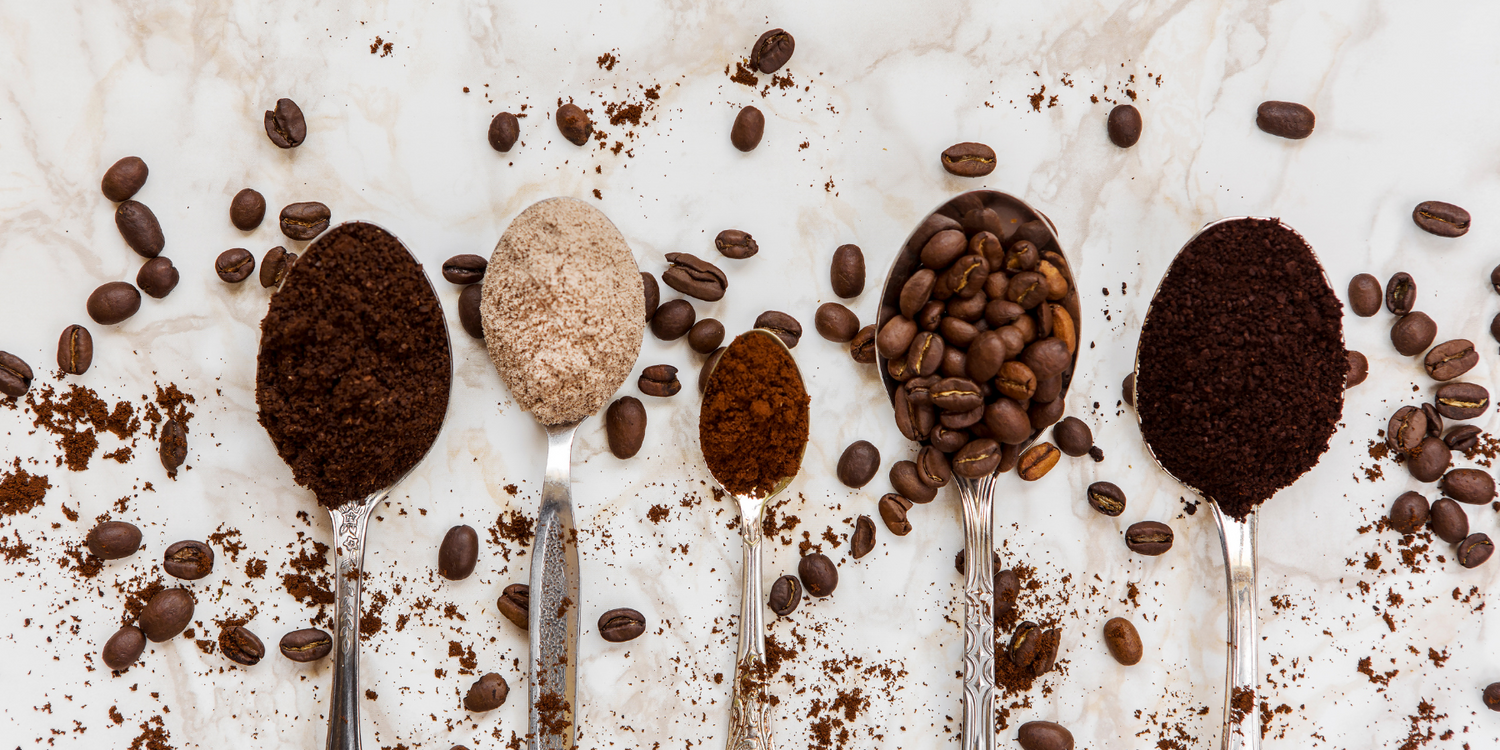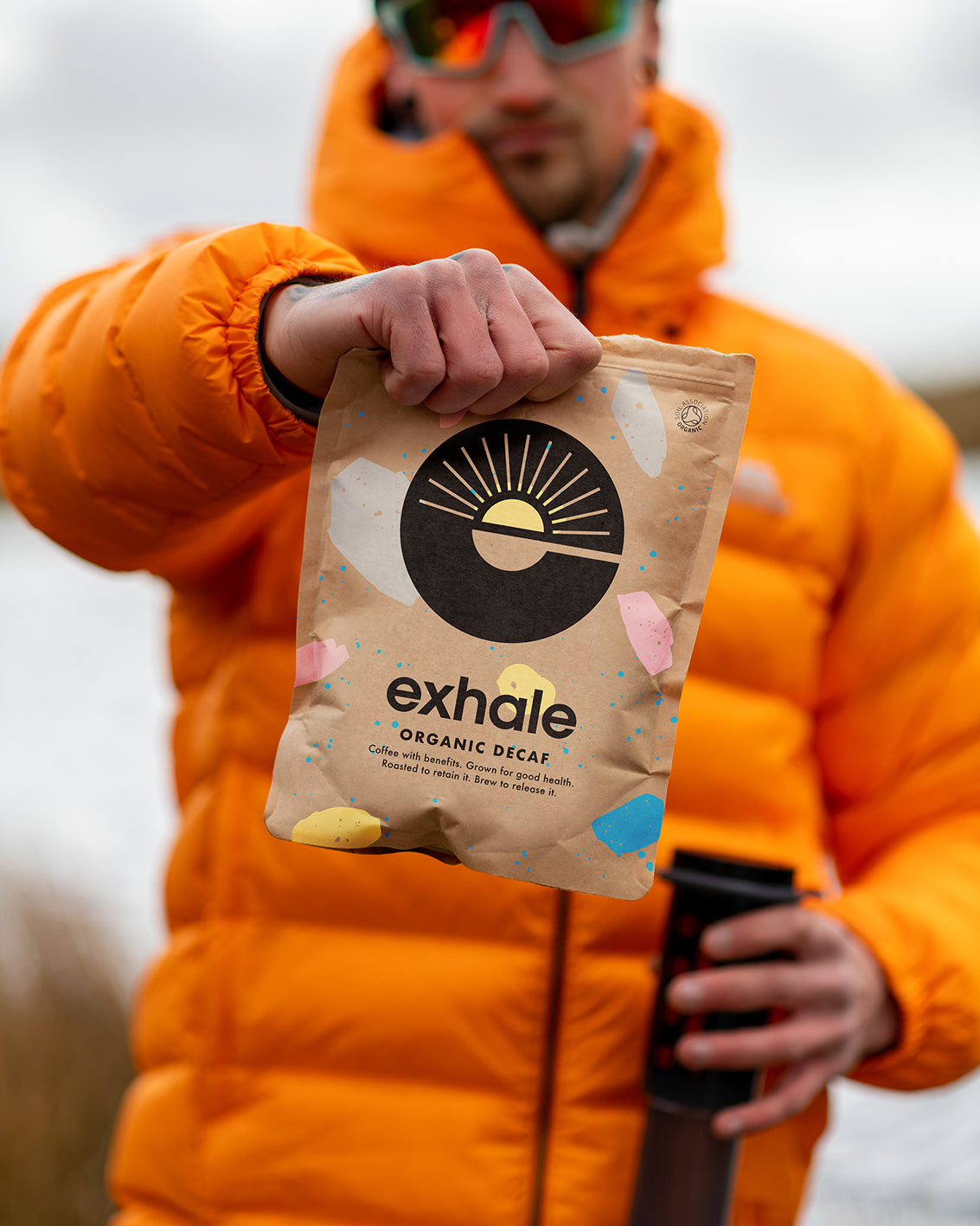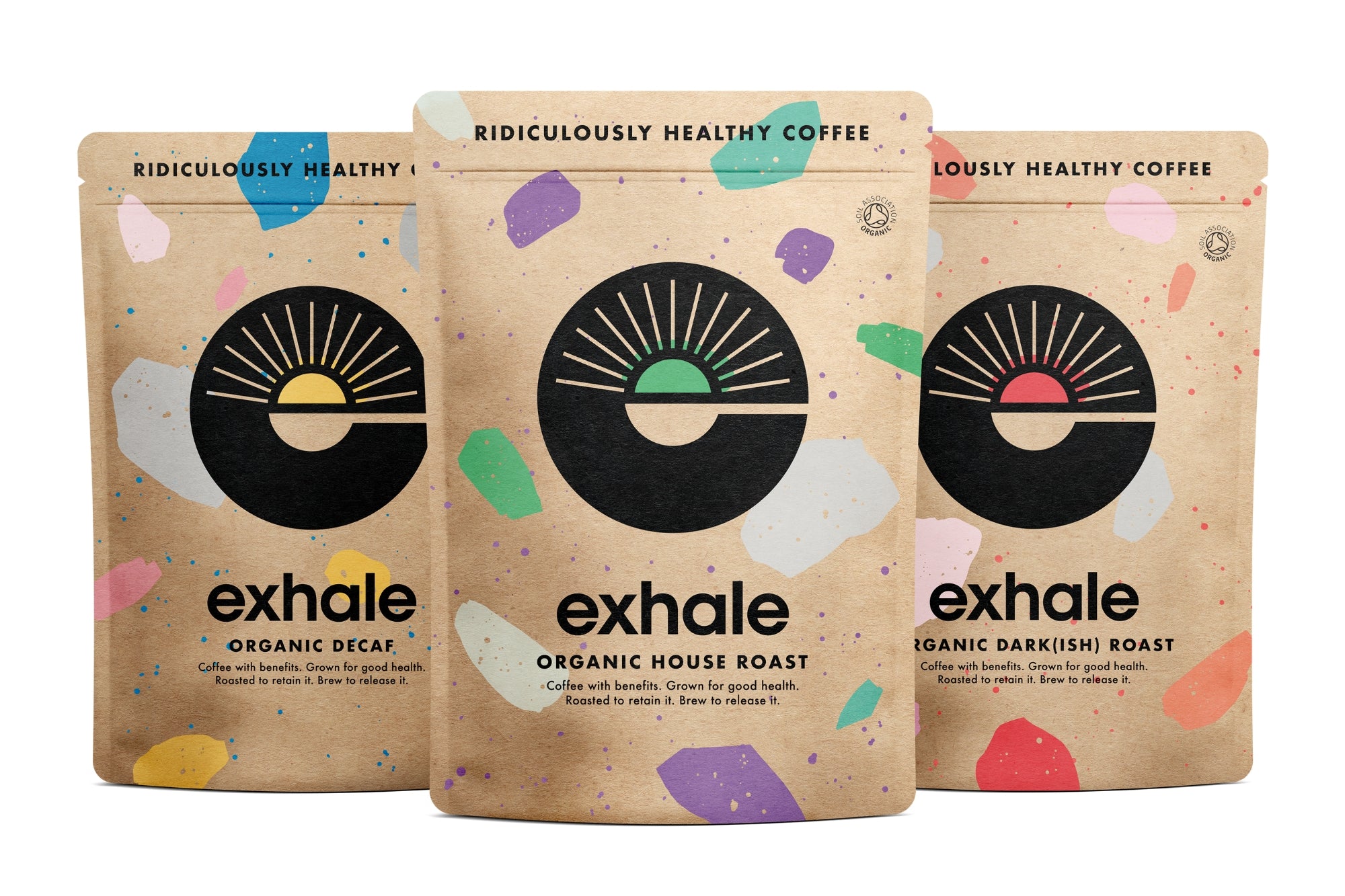By now you’ve probably heard the news, coffee’s actually really good for you.
In the past years, coffee has gone from being the villain in the movie to the paradoxical hero, and I’d like to think that we’ve played some part in that!
It’s not the guilty treat it once was considered. In fact, huge meta-analyses of studies covering hundreds of thousands of people, spanning multiple decades consistently link drinking coffee with a reduced risk of contracting some of the world’s worst diseases from coronary heart disease to 10 types of cancer to diabetes and beyond (16).
But does the same apply to instant coffee?
I turn my nose up at instant coffee, and Kirsty wouldn’t touch the stuff, but are we just another couple of coffee snobs?
Most importantly, what does the science say about instant coffee’s implications on your health?
Since almost 50% of the world’s green beans are used to produce instant coffee it’s high time we found out! (1)

What is instant coffee?
Apparently, it was invented in 1890 when the first patent was filed for instant coffee. But it wasn’t until the 1950’s when Nestlé capitalised on our insatiable thirst for convenience that it became mainstream. Read our blog on Pods to read about another invention for coffee convenience that needs to go away.
Instant coffee basically consists of regular coffee beans but with most of the water removed from them. This is mostly done by either freeze drying or spray drying the beans. That’s an oversimplification because there are a ton of industrial processes that happen in each method but we won’t go into detail here on what they are.
Our main question today is: even though they’re heavily processed before you buy them do they act the same in your body?
The mainstream view on instant coffee’s health benefits
There are ten’s of thousands of studies which look at coffee’s implications of health. But relatively few separate out instant coffee from regular coffee.
The few earlier studies which did were mixed with some showing a higher concentration of caffeine, niacin, diterpenes and chlorogenic acid (coffee’s most studied polyphenol) in roasted ground coffees (2,15, 34). But some amazingly showed the opposite (3,14).
So I think we can safely conclude that instant coffee contains a reasonable amount of antioxidants and polyphenols. But there’s a lot more going on in coffee so let’s dig a little deeper.

Most blogs written on the topic usually conclude by assuming that because coffee in general is linked to positive health effects then instant coffee must also be as healthy…
But I don’t like to make assumptions.
So I worked backwards chronologically and pulled out every study published that mentioned instant coffee to see what the latest scientific opinion is.
The results were pretty surprising…
What does the latest science say about how instant coffee affects your health?
Instant coffee’s effects on all-cause mortality and cardiovascular disease
In September 2022 a study published by the European Society of Cardiology followed almost 0.5 million people over 12 years (4).
They showed ground coffee drinkers had a 27% reduced risk of ‘all cause mortality’, i.e. of early death from any cause. Instant drinkers still had a reduced risk of early death, but much lower at only 11%.
For cardiovascular disease (CVD), they showed ground coffee drinkers had up to a 20%, reduced risk, vs a maximum of 9% reduced risk for instant coffee drinkers. For coronary heart disease it was 22% vs 9% and for CV mortality it was 35% vs 16%.
So drink real coffee for 2x to 2.5x the risk reduction across all measures.
In August 2018 another study of over 0.5 million people over 10 years showed all coffee drinkers had a reduced risk of all-cause mortality, including those who drank over 8 cups a day! But they also showed the risk reduction was twice as profound in drinkers of ground coffee vs instant coffee at 20% vs 10% for 2-3 cups a day (5).
Aside from all-cause mortality they looked at CVD which again was a much more pronounced reduction for ground coffee drinkers at 37% vs 10% for instant coffee drinkers of 2-3 cups a day. However, when they evaluated deaths from cancer they saw similar results for both ground and instant coffee drinkers.
It should be stated that these results are based on observational data. Nevertheless, they provide evidence that coffee drinking is associated with many health benefits and that they are 2 to 3 times more pronounced for drinkers of roasted and ground coffee vs instant coffee.

The case for instant coffee being as healthy as ground coffee
A couple of recent studies have shown an equally positive effect from drinking instant coffee and roasted and ground coffee on certain conditions. Including one published in May 2019 following 472k participants over 7.5 years which showed an incredible 53% reduced risk of hepatocellular carcinoma (the most common type of liver cancer) for ground coffee drinkers and a similar 49% reduced risk for instant coffee drinkers (6). But when it considered the sum of the risk of all digestive cancers, ground coffee drinkers had an 11% reduced risk any form of digestive cancer, and instant coffee drinkers only 3%.
Another study from October 2021 looked at instant coffee’s effect on arterial stiffening – a known cause of cardiovascular disease (7). It showed habitual moderate instant coffee consumption is inversely associated with arterial stiffening which could be why it leads to a lower incidence of CVD. It didn’t also look at drinkers of roasted coffee so no direct comparison can be made. But at least it was positive for instant coffee drinkers.
Is instant coffee unhealthy? The case against instant coffee.
This is where it get's interesting...
When I started researching this topic I expected to find that instant coffee was still associated with a reduced risk of disease, but just that it was less pronounced than for roasted and ground coffee.
I wasn’t expecting to find the below, very recently published studies...

Type 2 Diabetes (T2DM)
A paper published in February 2022 which studied 12 different ‘Genome-Wide Association Studies’, covering over 320k people, showed there was a ‘considerable difference between various coffee type choices’ (8).
They showed ground coffee was associated with significantly decreased risk of T2DM, but that instant coffee was ‘significantly associated with increased T2DM risk’.
Multiple previous studies have shown a reduced risk of T2DM from drinking coffee, some showing significantly reduced risks (9, 10, 11, 12) but this is the first one to separate out the effect of drinking instant coffee specifically instead of lumping all coffee consumption together.
Dementia
Coffee drinking has been associated with a reduced risk of a range of cognitive disorders in a number of studies. Read our blog on coffee’s affects on brain health for more. But they consider coffee drinkers as a whole.
In August 2021 the Nutritional Neuroscience journal published a study which showed that heavy instant coffee drinkers had a higher risk of Alzheimer’s Disease and dementia while moderate ground coffee drinking was associated with a lower risk of dementia and vascular dementia (13).
It’s just one study, but the case is mounting for more studies into instant coffee specifically…
But as a word of caution, in those with a high genetic risk of dementia, they did show that heavy coffee consumption in general (>6 cups a day) was associated with an increased risk of AD.
Breast Cancer
Traditionally coffee was thought of as a possible carcinogen. But in 2016 the World Health Organisation, after 'thoroughly reviewing more than 1000 studies', reversed their previous stance of 25 years that coffee was a possible carcinogen to say it can ‘reduce the risk of 5 types of cancer’.
Since then, similar risk reductions have been shown with other types of cancer as well.
Previously no relationship has been shown between coffee intake in general and breast cancer (42). But none have separated out the effects of instant coffee from regular coffee.

In September 2019, a hospital-based case control study of 2,169 women in Hong Kong aged between 24-84 years old looked the association of breast cancer with brewed coffee and with instant coffee (41).
To caveat: This is just one study which doesn’t prove anything, and lot more research needs to be done. But in the interests of making this a thorough summary of the latest research on instant coffee it is important to include all the research I found.
The study showed when looking at coffee drinkers in general, there was no net association with breast cancer risk.
However, when they analysed the different subgroups (adjusting for confounding variables) of coffee types they found that
drinking regular brewed coffee was associated with a 52% reduced incidence of breast cancer… and that conversely, ‘drinkers of instant coffee had a 41% increased risk of breast cancer’.
This study is just observational and doesn’t prove anything. And in July 2021 another study treated actual breast cancer cells in an incubator with coffee extracts, including 2 types of instant coffee (43). They concluded none of the samples were harmful to breast cancer cells.
Acrylamide
The high temperatures during the roasting of coffee produce Acrylamide, a common chemical also found in most heated starchy products, especially potato.
Acrylamide is a very soluble carcinogen that has been shown to cause tumours (17). But other, epidemiological studies haven’t shown evidence of an increased risk of some types of cancer after exposure to acrylamide in humans (18).
Another study done on rats has shown acrylamide to have some nasty effects in the gut (19) such as ‘vascular congestion, mucosal erosions, and depletion of the protective surface mucus together with widespread inflammatory infiltration in gastric samples’.

The quantities of acrylamide in coffee are relatively small compared to other foods, like the nation’s favourite food - chips. But since it is produced by roasting the beans, and is higher in dark roast coffee, it provides more weight behind our decision to roast to a light to medium level and go no darker than our dark(ish) roast.
The paradox here is that as you roast coffee melanoidins are created by the maillard reaction which have known anti-inflammatory, antioxidant effects (20) as well as providing a valuable source of up to 20% of our daily recommended daily intake of dietary fibre (21).
In summary, the ideal, and what we do at Exhale, is aim to roast to a level that maximises the healthy melanoidins yet keeps the acrylamide levels as low as possible.
I digress, that’s a blog for another time so back to the point…
Instant coffee has been shown to contain higher levels of acrylamide according to a recent study in Feb 2020 (22).
This confirms evidence in previous studies that instant coffee can contain up to twice the amount of acrylamide of roasted and ground coffee (23, 24).
The European Food Safety Authority says this level is much lower than is dangerous in humans (25), but other research shows that even low level exposure over prolonged periods of time can be neurotoxic (26).
Given the conflicting research surrounding whether or not they pose a risk, minimising exposure is probably a good idea and the evidence showing instant coffee contains higher levels is clear.
Mycotoxins
For the full scoop on mycotoxins, including an explanation of why you might want to choose a coffee that’s free from them, read our blog on mycotoxins here.

In a nutshell, they can cause some serious illnesses, or as the World Health Organisation put it “Mycotoxins can cause a variety of adverse health effects and pose a serious health threat to humans. The adverse health effects of mycotoxins range from acute poisoning to long-term effects such as immune deficiency and cancer.”
Mycotoxins are all around us, and in small quantities our bodies can deal with them pretty well.
Mycotoxins are also in most coffees (27, 28), but incredibly a 2019 study showed 12% of our TOTAL exposure to Ochratoxin (OTA), one type of mycotoxin, can come from drinking coffee alone (29)!
The question is, what constitutes ‘small quantities’? And at what level do they become a ‘serious threat to humans’?
The European Commission (EC) set guidelines for the maximum safe levels legally allowed in foods. But if you speak to most nutritional therapists they will tell you those levels are far too high. Well, it seems the EC are starting to agree and from the 1st January 2023 they significantly reduced the safe maximum levels legally allowed in coffee.
What’s this got to do with instant coffee?

In December 2021 a study found Ochratoxin A (OTA), in all samples of instant coffee tested, and in 89.5% of roasted coffees tested (30). But importantly,
almost quadruple the amount of mycotoxins was found in instant coffee
compared to roasted coffee! In roasted coffee the average was 0.79 μm/kg vs 3.00 μm/kg in instant coffee.
The median for roasted coffee was 0.66 μm/kg vs 4.33 μm/kg for instant coffee. Over 6 times the amount.
The new safe limit set by the EC is 5 μm/kg for instant coffee or 3 μm/kg for roasted coffee meaning your average instant coffee could contain enough to pose a serious health risk.
Another recent study published in December 2020 found moulds in all instant coffees tested and higher levels of OTA in instant coffee (38). And another in January 2020 found considerably higher amounts in instant coffee – with an average concentration of 0.6 μg/kg in roasted ground coffee samples vs 2.9 μg/kg in instant coffee’s tested (39).
They reported up to 12.8 μg/kg of Ochratoxin in some instant coffees which is over double the new safe limit of 5 μg/kg set by the EC!
These studies confirm previous ones that instant coffee contains ‘significantly more’ mycotoxins than regular coffee (31, 32, 33).
In summary, mycotoxins pose a serious health risk. It’s disputed what the safe level is in humans. But by anyone’s standards, instant coffee typically flies very close to the wire and often contains mycotoxins at dangerous levels. So providing further evidence for drinking fresh roasted and ground coffee instead of instant coffee as a minimum… or play it safe and drink a coffee that’s independently lab tested to be free from moulds and mycotoxins, like Exhale Healthy Coffee is.
A word on caffeine
Love it or loathe it, caffeine is now linked with a wide range of health benefits, especially those related to cognitive disorders such as Alzheimer’s Disease (35) and Parkinson’s Disease (36, 37).
It’s here to stay, and unless you’re especially sensitive to it, it does you far more good than harm when consumed in coffee (watch this space for a blog on why coffee is a healthier source of caffeine than any other).
Instant coffee contains less caffeine than regular coffee. On average it contains 60 to 85mg per serving vs 75 to 165mg per serving of brewed coffee (40). Giving you less of the energy boost traditionally associated with caffeine, and potentially less of the health benefits too.
However, some people have a lower tolerance of caffeine as dictated by their genes. If this is you, for reasons established in this blog already, we recommend either switching to an optimised, water processed, contaminant free decaf like Exhale Organic Decaf… or try mixing half or our Organic House Roast coffee and half decaf for half the amount of caffeine which is what we do at Exhale HQ for our mid-afternoon coffee.

Conclusions
To conclude, when I decided to write this blog I expected to read that instant coffee was still considered healthy, but just that the benefits are less pronounced than in regular coffee.
I also expected it to be a simple blog and I’d be able to research and write it in a matter of hours!
How wrong I was on both fronts.
From my extensive research of the full breadth of the most current, published science on instant coffee 🥴 I conclude that:
-
Instant coffee is often associated with health benefits, but that they are less pronounced.
-
But, there is also mounting evidence from the most recent research that instant coffee could actually be pretty bad for you.
More research is clearly needed, but these recent studies provide a strong case for going back over previous studies on coffee in relation to other diseases to separate out the effects of instant coffee from regular coffee.
Most people think of coffee as a guilty treat (except health professionals, scientists and anyone else in the know). But it’s had a bad rep for far too long.
I conclude this blog by proposing that coffee gained it's reputation as being unhealthy because instant coffee is bad for you, not fresh roast coffee. Because there has been a failure in the research to separate out regular coffee drinkers from instant coffee drinkers... until recently.
Al x
NOTE: just as all regular coffee's aren't created equal (hence the reason for Exhale's existence) all instant coffee's aren't equal either. For example, are they blends or single origin? Organic? What process was used? Provenance? Was it grown at altitude or shade grown? Is it speciality grade? If you insist on drinking it there are some brands that will definitely be better than others!
P.S. I hope you found this blog useful. Feel free to drop me an email with your thoughts or if you know of any research I’ve missed. I’d love this to be a living document and continually update it whatever research is published. alex@exhalecoffee.com
(1) https://www.sciencedirect.com/science/article/abs/pii/S0308814608014106.
(2) https://www.sciencedirect.com/science/article/abs/pii/S0889157513001166
(3) https://www.ncbi.nlm.nih.gov/pmc/articles/PMC5502025/
(4) https://pubmed.ncbi.nlm.nih.gov/36162818/
(5) https://www.ncbi.nlm.nih.gov/pmc/articles/PMC6143111/
(6) https://pubmed.ncbi.nlm.nih.gov/31040384/
(7) https://pubmed.ncbi.nlm.nih.gov/34620341/
(8) https://pubmed.ncbi.nlm.nih.gov/35222278/
(9) https://pubmed.ncbi.nlm.nih.gov/23193459/
(10) https://pubmed.ncbi.nlm.nih.gov/20008687/
(11) https://pubmed.ncbi.nlm.nih.gov/16443894/
(12) https://pubmed.ncbi.nlm.nih.gov/35930394/
(13) https://pubmed.ncbi.nlm.nih.gov/34424144/
(14) https://www.ncbi.nlm.nih.gov/pmc/articles/PMC7696595/
(15) https://link.springer.com/article/10.1007/s13197-016-2378-6
(16) https://www.ncbi.nlm.nih.gov/pmc/articles/PMC5696634/#ref107
(17) https://pubmed.ncbi.nlm.nih.gov/15668103/
(18) https://pubmed.ncbi.nlm.nih.gov/21239401/
(19) https://pubmed.ncbi.nlm.nih.gov/25882756/
(20) https://pubmed.ncbi.nlm.nih.gov/24671262/
(21) https://pubmed.ncbi.nlm.nih.gov/22627289/
(22) https://pubmed.ncbi.nlm.nih.gov/31697219/
(23) https://pubmed.ncbi.nlm.nih.gov/15053542/
(24) https://pubmed.ncbi.nlm.nih.gov/24325083/
(25) https://www.efsa.europa.eu/en/efsajournal/pub/4104
(26) https://pubmed.ncbi.nlm.nih.gov/23541332/
(27) https://www.ncbi.nlm.nih.gov/pubmed/14726276
(28) https://www.ncbi.nlm.nih.gov/pubmed/7759018
(29) https://www.ncbi.nlm.nih.gov/pmc/articles/PMC6628416/
(30) https://pubmed.ncbi.nlm.nih.gov/35011417/
(31) https://pubs.acs.org/doi/10.1021/jf504254q
(32) https://pubmed.ncbi.nlm.nih.gov/26965577/
(33) https://www.sciencedirect.com/science/article/abs/pii/S0956713514002606
(34) https://www.sciencedirect.com/science/article/pii/S2090123219300025
(35) https://pubmed.ncbi.nlm.nih.gov/33562156/
(36) https://pubmed.ncbi.nlm.nih.gov/33390888/
(37) https://pubmed.ncbi.nlm.nih.gov/17712848/
(38) https://pubmed.ncbi.nlm.nih.gov/33096150/
(39) https://doi.org/10.3920/WMJ2019.2507
(40) https://foodinsight.org/everything-you-need-to-know-about-caffeine-2/
(41) https://www.ncbi.nlm.nih.gov/pmc/articles/PMC6722060/
(42) https://pubmed.ncbi.nlm.nih.gov/22020403/
(43) https://www.ncbi.nlm.nih.gov/pmc/articles/PMC8304909/






4 comments
Andy Wharam
Hi Alex & family, firstly, many thanks for the excellent free sample of your Organic Exhale ground coffee that I’m enjoying right now! With No milk that I normally have in my daily coffee! This is the first time for how ever many years I can remember having my coffee Black without No milk! And I can report that it tastes Far less bit than you associate with other non organic ground coffee!
To think that I’m drinking from just 1 mug the equivalent of 500 grams of blueberries 🫐 with All the antioxidants it contains, which is incredible! Thanks to your scientific knowledge and expertise you have spent many years to bring to the market what must surely be the most beneficial & healthy ground coffee ☕️ in the world 🌎, as someone with slightly high blood pressure and mild cholesterol in my arteries, this amazing coffee should surely put a stop to high blood pressure & cholesterol for Everyone who drinks at least 2 cups per day, their health & weight will benefit greatly from this brilliant Exhale coffee, Well done Alex and your Mrs for bringing this excellent health product to the market 🤗.
Podmore Sussie
Thank you for this helpful info! Based upon the above, can you suggest an organic instant coffee??! I know you don’t make one but occasionally it comes in handy!
Sam
There have been no well controlled studies involving instant coffee. I think writing it off at this point would be jumping the gun. To properly compare instant and ground coffee, one would need to at the very least control for the type of bean sourced and the level of roast. Even among instant coffees, the drying method would also have a significant effect on the concentration of polyphenols and other nutrients.
Similar to how the author would like to see more studies comparing instant to ground, wouldn’t it also be beneficial to see studies comparing different varieties of instant coffee? Let’s say a light roasted freeze dried vs your typical nescafe dark roast.
There’s definitely some confirmation bias in this piece
Rocky
Great article with an amazing amount of research!
I don’t know if all of these scientists considered the origin of the beans and coffee they were were researching. Most Instant coffee, especially in commodity amounts like with nestlé, are made with robusta beans…
“Robusta coffee contained significantly larger amounts of acrylamide (mean = 708 ng/g) than Arabica coffee (mean = 374 ng/g). Asparagine is the limiting factor for acrylamide formation in coffee. 3-Aminopropionamide formation was observed in a dry model system with mixtures of asparagine with sugars (sucrose, glucose).Feb 9, 2023”
https://www.researchgate.net/publication/5226825_Determination_of_Acrylamide_during_Roasting_of_Coffee#:~:text=Robusta%20coffee%20contained%20significantly%20larger,sugars%20(sucrose%2C%20glucose).
Leave a comment
All comments are moderated before being published.
This site is protected by hCaptcha and the hCaptcha Privacy Policy and Terms of Service apply.